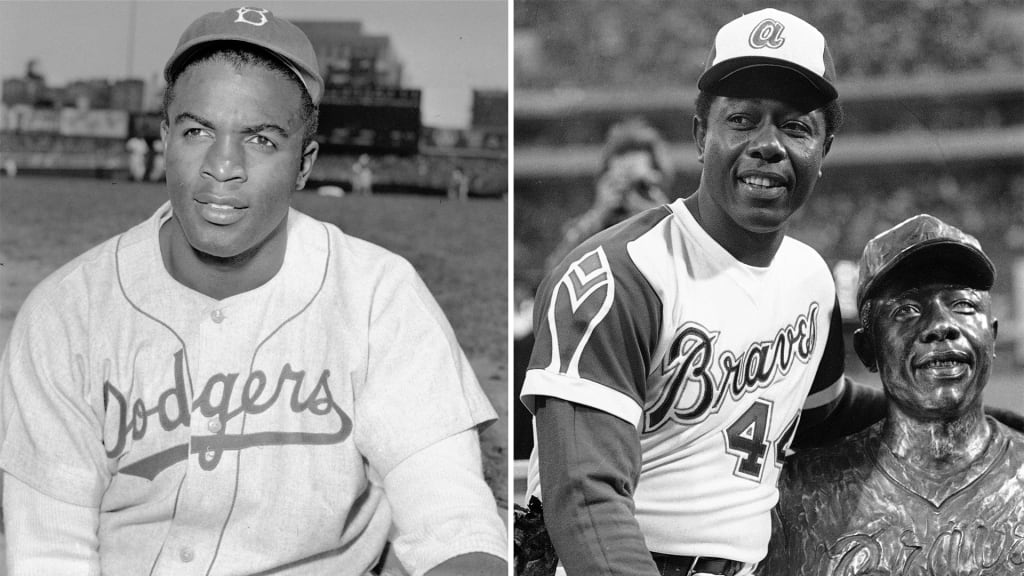
"A version of this story was originally published in April 2020."
ATLANTA -- Asked about Dr. Martin Luther King Jr. a few years ago, Hank Aaron emphasized the importance of continuing to honor the memories of King, Jackie Robinson and others who paved the way for the United States to distance itself from its ugly segregated past.
“There was a time when I thought that all the things [King] and the other civil rights leaders had done was unappreciated by young people,” Aaron said. “History has taught us if you don't keep pounding issues into their heads, they'll soon forget about what happened."
So as the baseball world celebrates Jackie Robinson Day, it’s important to remember what occurred in Atlanta both on April 8, 1974, and April 8, 1949.
On the more recent date, Hall of Fame broadcaster Vin Scully reacted to Aaron breaking Babe Ruth’s home run record by delivering these words: “What a marvelous moment for baseball. What a marvelous moment for Atlanta and the state of Georgia. What a marvelous moment for the country and the world. A black man is getting a standing ovation in the Deep South for breaking a record of an all-time baseball idol.”
Exactly 25 years earlier, three miles north of where Aaron hit his historic 715th homer, Robinson also created history when he and Brooklyn Dodgers teammate Roy Campanella became the first African-American players to play in an integrated professional game in the Deep South. The Dodgers began a three-game exhibition series against the Minor League Atlanta Crackers at Ponce de Leon Park that day.
“It was more than a game. It was definitely an event,” said longtime Braves usher Walter Banks, who was a 9-year-old Atlanta resident when Robinson came to town. “I’ve been so proud of it over the years because things like that just didn’t happen.”
Robinson broke MLB’s color barrier when he debuted for Brooklyn on April 15, 1947. He had played two full seasons before coming to Atlanta for these exhibition games, but this trip was still historic -- and dangerous. The Ku Klux Klan objected to this planned event, arguing the staging of interracial games went against Jim Crow laws, which mandated racial segregation in all public facilities within former Confederate states.
Fortunately, Dodgers owner Branch Rickey received assistance from many of Georgia’s progressive politicians, including mayor William Hartsfield. Atlanta police chief Herbert Jenkins began a vigorous reform plan when he assumed that role in 1947. He abolished what was considered a Klan-dominated union and integrated the police force in 1948.
“When I was in the sixth grade, we went to Washington, D.C., and police chief Jenkins was on the train with us,” Banks said. “When I saw him, it was like I saw a rock star. That’s how I felt about him because he always had such a good reputation about race relations.”
According to author Tim Darnell, who wrote “The Crackers: Early Days of Atlanta Baseball”, Jenkins quickly quelled the death threats Klan members were directing toward Robinson, Campanella and Earl Mann, who owned the Crackers.
“It just so happened Jenkins was sitting at Mann’s house having dinner that night the Klan’s Grand Dragon called,” Jenkins said. “So Mann said, ‘Hold on a minute. I’m going to let you tell Atlanta’s police chief what you just told me.’ The Grand Dragon hung up and they never heard from him again.”
Historical accounts indicate some protesters stood outside the Dodgers’ downtown Atlanta hotel and voiced their displeasure while attending the three games. But the exhibition series was completed without incident and a majority of the fans showed their appreciation for Robinson and Campanella.
According to Atlanta sports author and historian Jim Weathersby, before the series, Robinson, a native of Cairo, Ga., said, “This is the most thrilling experience of my life. It’s the most wonderful thing that ever happened to me. It’s great to feel that I am playing a part in breaking down the barriers against the people of my race.”
Per the Georgia Historical Society, more than 25,000 fans filled the 15,000-seat Ponce de Leon Park, which was located across from where Ponce City Market currently sits. Though the fans were still segregated, with most of the black fans forced to sit in the outfield, the progress made that weekend helped set the stage for Aaron and the Braves to move from Milwaukee to Atlanta in 1966.
The fact that Robinson visited Atlanta exactly 25 years before Aaron would create one of sports most iconic moments stands as just one of the many links shared by these legendary men.
Aaron’s first career hit was recorded on April 15, 1954, and his No. 44 was retired by the Braves on April 15, 1977, the 30th anniversary of Robinson breaking the color barrier.
“That is something,” Aaron said when informed of this last year. “I am very proud of that.”
As Aaron and his wife remained quarantined at the start of last year’s coronavirus pandemic, he admitted he shed a few tears while missing baseball. But the late, great icon said he was looking looking forward to the day when “kids can go to games and shake hands and do whatever they want to do and act like that’s what this game is all about.”
Thanks to Aaron, Robinson and others, today’s kids can truly enjoy baseball’s unifying power.
